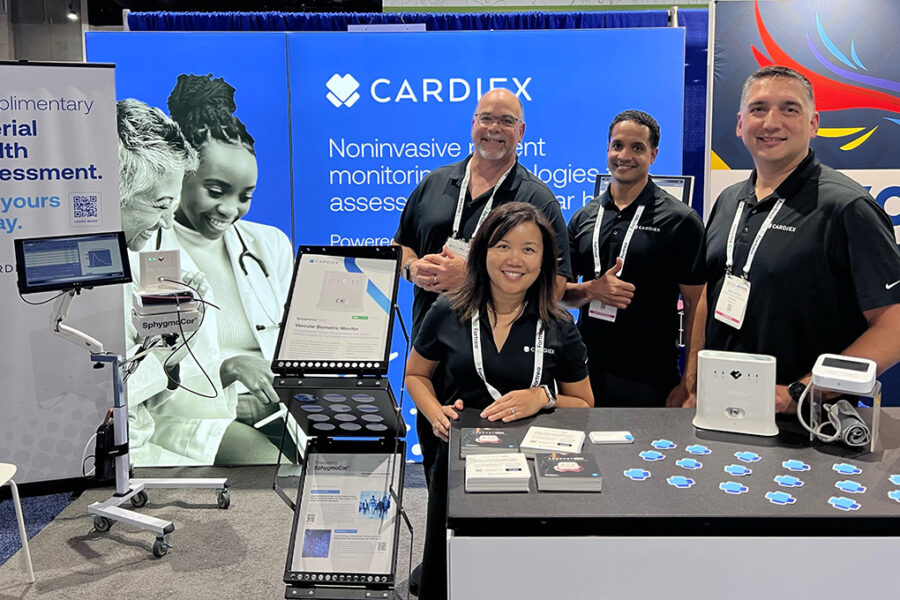
Understanding Digital Vascular Biomarkers: What Is Pulse Pressure?
March 16, 2023
The Importance of Central Blood Pressure
March 17, 2023High Blood Pressure and Alzheimer’s Disease
Research shows vascular health plays a strong role in cognitive decline. Here’s everything you need to know.
More than six million Americans suffer from Alzheimer’s disease, the most common form of dementia, according to the Alzheimer’s Association. And in 2021, Covid-19 contributed to a 17% increase in Alzheimer’s diagnosis, noted a 2021 special report in the journal Alzheimers and Dementia. Those researchers now estimate that by 2050, Alzheimer’s cases will balloon to 13 million as retirement-age Americans leave the workforce. And for people in the final stages of Alzheimer’s tragic slow dance, the end can be incredibly grim. As author Jeffrey Kluger writes, “Most illnesses attack the body; Alzheimer’s destroys the mind – and in the process, annihilates the very self.”
What Causes Alzheimer’s?
Characterized by distinct changes in brain structure that are visible on an MRI, Alzheimer’s scans reveal a neurotoxic buildup of two abnormal proteins, amyloid plaques and tau neurofibrillary “tangles,” says Daniel Nation, Ph.D., an associate professor at the Institute for Memory Impairment and Neurological Disorders at the University of California Irvine.
While experts say the factors that cause some people to develop degenerative plaques and tangles are complex and likely multifactorial, a large body of evidence now suggests high blood pressure plays a key role, according to the American Heart Association. “It’s a very powerful association,” Nation says. “If you don’t have healthy vessels, you can’t have a healthy brain.”
High Blood Pressure and Alzheimer’s
In a 2019 study published in Hypertension, researchers found that people aged 55 years and older with hypertension were more likely to have Alzheimer’s disease biomarkers like beta-amyloid and tau, which neurophysiologist George Bloom, Ph.D, calls the “trigger and bullet in the disease’s pathogenesis.” These abnormal proteins collect between (amyloid) and inside (tau tangles) neurons, blocking the neuron’s transport system, preventing nerve cells from communicating with each other properly.
And in 2017, researchers found that elevated blood pressure during midlife (40-64 years) was associated with an increased dementia risk, according to a study published in the Journal of Neurology.
In terms of the causal link between hypertension and Alzheimers, Nathan says many factors likely play a role. “For one thing, we know high blood pressure is a major risk factor for stroke. And if you have multiple strokes, or even one stroke that causes severe brain damage, you can get vascular dementia.”
Hypertension can also cause cerebral small vessel disease, a condition that affects the small arteries and microvessels in the brain, Nathan says. “Those show up as white matter lesions on brain MRIs.”
By damaging fragile capillaries that feed the brain, researchers believe high blood pressure can limit the flow of oxygen-rich blood to this important organ, according to a 2020 review published in the journal Acta Neuropathology.
Vascular problems can also lead to a breakdown of blood-brain barrier, which protects the brain from harmful substances while allowing in glucose and other critical factors, notes the National Institute on Aging. Once the blood brain barrier is compromised, glucose fails to reach the brain, causing toxic amyloid and tau proteins to build up, Nathan explains. This triggers inflammation, which further damages the brain’s vascular system, per the NIA.
How High Blood Pressure Affects Blood Vessels
Blood pressure measures the force blood exerts on the walls of the arteries as the heart beats (the top number or systolic pressure) and when it is at rest between beats (the bottom number, or diastolic pressure). When the blood puts too much pressure on the vessels (or arteries), it causes hypertension.
If you are like almost half of Americans, you may qualify as hypertensive under the new guidelines, according to the American Heart Association. Normal pressure is now defined as a reading of 120/80 or lower.
The first stage of ‘high’ blood pressure is a measurement of 130/80. Stage 2 is 140/90 or above. Note: If you get a reading of 180/110 more than once, go to the ER right away as this is considered a “hypertensive crisis—a medical emergency with a high risk of complications such as heart attack or stroke.”
Blood Vessels and the Brain
“In a healthy brain, there is a capillary blood vessel for every neuron,” Dr. Nation says. (Neurons are specialized nerve cells in the brain that transmit information to other nerve cells, muscle cells or glands, according to the National Institute of Neurological Disorders and Stroke).
In fact, if you unwrapped all the blood vessels in the brain, it would end up around 400 miles long. To get a sense of this enormity, scientists often say there are as many neurons in the human brain as stars in the Milky Way.
While this may be a slight exaggeration (the brain contains around 86 billion neurons while researchers estimate the universe has between 200 and 400 stars), the analogy isn’t far off.
“The vasculature — the network of blood vessels in the brain — is vast and intimately intertwined with the neuronal system so if it’s not working properly, the brain suffers,” Dr. Nation explains.
Why Blood Pressure Variability Matters
Blood pressure variability (BPV) refers to the dynamic changes in blood pressure from minute to minute and across a person’s lifespan. “Blood pressure is affected by so many factors: caffeine, anxiety, or how recently we’ve eaten a big meal,” Dr. Nation explains. “It’s a highly variable metric that’s constantly changing.”
And this variability can have grave consequences for your brain, compromising blood flow and contributing to toxic tangles of abnormal tau proteins, key hallmarks of Alzheimer’s disease. “Blood pressure variability is a new risk factor that hasn’t been studied as much as standard blood pressure but it seems to be even more important,” Dr. Nathan says.
Research suggests a high visit-to-visit blood pressure variability is associated with accelerated cognitive decline in patients with Alzheimer’s disease.
Central Blood Pressure: A Key Vascular Biomarker
As previously noted, both stroke and dementia tend to be preceded by the development of cerebrovascular disease, a group of conditions that compromise blood flow and the functioning of blood vessels in the brain. In assessing the risk for a subclinical state of this disease, researchers reporting in the journal Hypertension compared the efficacy of central blood pressure in the aorta (CBP) versus brachial blood pressure taken in the arm (BBP). Both measures were associated with silent brain infarcts: symptomless strokes that can cause mild cognitive deficits that sometimes go unnoticed.
But when researchers looked for another important biomarker of cognitive risk: brain lesions, known as white matter hyperintensities (WMHs), only central blood pressure readings—not brachial—were significantly associated with an increase in this important risk factor.
This suggests that measuring central blood pressure, which can now be done non-invasively using Atcor’s proprietary SphygmoCor technology, is a more effective way of identifying cerebrovascular disease than brachial blood pressure alone.
The Importance of Home Blood Pressure Monitoring
The American Heart Association recommends that anyone with known or suspected hypertension should monitor their blood pressure (and BPV) with a home monitor. Taking blood pressure into your own hands can help you measure your progress in lowering your numbers.
Measuring your blood pressure at home can also help you understand your daily fluctuations, and the impact they can have on your health. For example, are you a “dipper?” Most people’s blood pressure dips by 10-20% at night, which gives their heart a break.
But some people never experience these nocturnal dips (researchers don’t know why) which makes them more vulnerable to cardiovascular disease and, by extension, Alzheimer’s and other forms of dementia, according to a report in the World Journal of Cardiology.
Blood Pressure Medication Can Lower the Risk of Alzheimer’s
And now for some good news: Blood pressure medication has been shown to help mitigate the risk of cognitive decline, according to the 2015 study published in New England Journal of Medicine. In this study, researchers found that aggressively reducing high blood pressure to currently recommended levels (120/80) decreased mild cognitive impairment (MCI), a precursor to dementia.
SOURCES:
- Iadecola, Costantino et al. “Impact of Hypertension on Cognitive Function: A Scientific Statement From the American Heart Association.” Hypertension (Dallas, Tex. : 1979) vol. 68,6 (2016): e67-e94. doi:10.1161/HYP.0000000000000053
- Benjamin EJ, Virani SS et al. American Heart Association Council on Epidemiology and Prevention Statistics Committee and Stroke Statistics Subcommittee. Heart Disease and Stroke Statistics-2018 Update: A Report From the American Heart Association. Circulation. 2018 Mar 20;137(12):e67-e492. doi: 10.1161/CIR.0000000000000558. Epub 2018 Jan 31. Erratum in: Circulation. 2018 Mar 20;137(12 ):e493. PMID: 29386200.
- Eichmann, Anne, and Jean-Léon Thomas. “Molecular parallels between neural and vascular development.” Cold Spring Harbor perspectives in medicine vol. 3,1 a006551. 1 Jan. 2013, doi:10.1101/cshperspect.a006551
- Bradely Voytek, Brain Metrics: How measuring brain biology can explain the phenomena of mind (Scitable, 2013)
- Alzheimer’s Association, Alzheimer’s Disease Facts & Figures
- Gallardo, Gilbert, and David M Holtzman. “Amyloid-β and Tau at the Crossroads of Alzheimer’s Disease.” Advances in experimental medicine and biology vol. 1184 (2019): 187-203. doi:10.1007/978-981-32-9358-8_16
- Hughes, Timothy M, and Kaycee M Sink. “Hypertension and Its Role in Cognitive Function: Current Evidence and Challenges for the Future.” American journal of hypertension vol. 29,2 (2016): 149-57. doi:10.1093/ajh/hpv180
- McGrath, Emer R et al. “Blood pressure from mid- to late life and risk of incident dementia.” Neurology vol. 89,24 (2017): 2447-2454. doi:10.1212/WNL.0000000000004741
- National Institute of Neurological Disorders and Stroke, Brain Basics: The Life and Death of a Neuron.
- Parati, Gianfranco et al. “Blood pressure variability: clinical relevance and application.” Journal of clinical hypertension (Greenwich, Conn.) vol. 20,7 (2018): 1133-1137. doi:10.1111/jch.13304
- National Institute on Aging, What Happens to the Brian in Alzheimer’s Disease?
- de Heus, Rianne A A et al. “Blood Pressure Variability and Progression of Clinical Alzheimer Disease.” Hypertension (Dallas, Tex. : 1979) vol. 74,5 (2019): 1172-1180. doi:10.1161/HYPERTENSIONAHA.119.13664
- Sible, Isabel J et al. “Visit-to-Visit Blood Pressure Variability and Longitudinal Tau Accumulation in Older Adults.” Hypertension (Dallas, Tex. : 1979) vol. 79,3 (2022): 629-637. doi:10.1161/HYPERTENSIONAHA.121.18479
- SPRINT Research Group et al. “A Randomized Trial of Intensive versus Standard Blood-Pressure Control.” The New England journal of medicine vol. 373,22 (2015): 2103-16. doi:10.1056/NEJMoa1511939
- Bloomfield, Dennis, and Alex Park. “Night time blood pressure dip.” World journal of Cardiology vol. 7,7 (2015): 373-6. doi:10.4330/wjc.v7.i7.373



